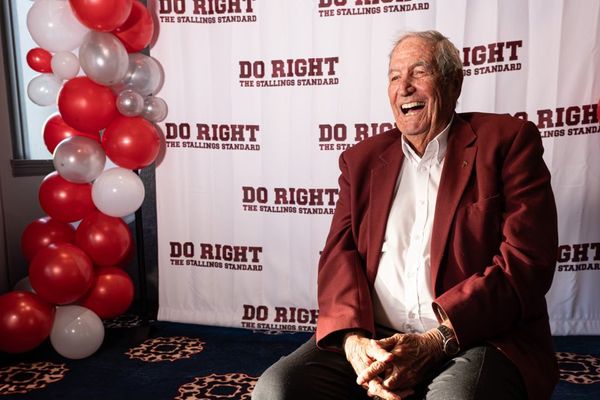
Professors at The University of Alabama honored former Alabama football coach Gene Stallings in a new documentary highlighting his legacy. The Bama Theatre in Tuscaloosa showed a screening of the documentary on Thursday with nearly 500 people in attendance.
Chandra Clark, assistant professor in the department of journalism and creative media, said she and Michael Bruce, associate professor and the journalism and creative media department chair, have worked on the documentary together since 2018.
Stallings, who is 89 years old and living in Paris, Texas, was the football coach from 1990 to 1996 and led the 1992 Crimson Tide team to a 13-0 season with a win in the Sugar Bowl against Miami.
“We asked Coach Stallings and his wife what they would like for us to do,” Clark said. “He said, ‘I’m still here and I still have a story to tell.’”
Stallings gave Clark and Bruce the names of over 150 people to interview about his life due to him not being able to participate in the whole documentary because of his health. They spent hours researching and interviewing family, friends, fellow coaches and former players, learning about the impact Stallings had.
In 2018, the angle of the documentary changed from the players to Stallings’ relationship with his late son John Mark Stallings, who had Down syndrome and died in 2008.
“We were able to dig more into his family history, the legacy and the ripple effects of the family’s decisions and what they did in reaching out to hundreds of families that have special needs children,” Clark said.
The documentary is an hour and a half long and shows the growth Stallings had with his son.
“I thought that [the documentary] was really powerful. He was saying it wasn’t his son that needed to change, it was his attitude towards the situation,” said Ginger Jolly, a professor in the College of Communication & Information Sciences.
Clark said the meaning of the documentary was to show that everyone can be respected and how one action can impact someone’s life.
Those who went to the premiere had an opportunity to meet Stallings. Jolly said the line to meet him was out the door, and many reunions took place in the lobby.
“You could tell that there was a lot of enthusiasm,” Jolly said of people meeting Stallings. “It was motivational to see how someone applies his philosophy of life to his life, and how enriching his life was because of the problems and challenges he had.”
During the showing, Jolly described the audience as emotional, saying she heard sniffling around her.
“I can tell that people were really touched by the story, particularly the story about the relationship between Gene Stallings and his son, it was that moving,” Jolly said. “It really kept moving and kept me really engaged. The editing was just fabulous.”
Those who knew Stallings as a coach and went to see the documentary have praised the documentary and said it was nice to meet with old players and friends and meet with the coach again.
Jolly said that while former Alabama head coach Nick Saban was not at the screening, he was featured in the documentary talking about how Stallings impacted his life.
At the end of the premiere, Clark asked everyone to take a token that had the name of the documentary on the back. The token was to be a reminder to think of their actions in life.
“Stallings’ whole philosophy pretty much boiled down to ‘doing right in whatever circumstance you’re in is going to make everything come out okay, even if it’s not an easy circumstance,’” Jolly said about that moment at the showing. “Holding on to this token is a way to kind of remember that.”
Stallings has given a platform to many organizations that give voices to those with disabilities. One of these organizations is the RISE Center, a learning school for children with disabilities. The program is dedicated to service, research and teaching.
The next showing for the documentary will be on Sunday at the Shoals Theatre in Florence, Alabama. There is a third showing in Paris, Texas, on Nov. 3.
“He [Stallings] is known a lot for football and for being a coach, but he wants his legacy to be known for what he’s done to help people with varying abilities from birth to adulthood,” Clark said.









